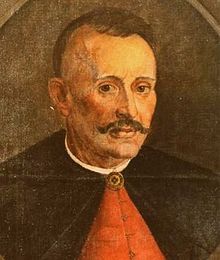Samuel Przypkowski
Johann Samuel Przypkowski , also Przipcovius and Pripcovius, (* 1592 in Gnojnik (Tarnów), † June 19, 1670 in Königsberg ) was a Polish writer , statesman and an important representative of Polish-Lithuanian unitarianism .
life and work
Samuel Przypkowski 1592 in the small Polish born Gnojnik into a noble family in. His father Nicholas Przypkowski was involved in the Unitarian Church in Lusławice. Samuel Przypkowski first attended the Unitarian Academy in Lusławice . Between 1614 and 1616 he studied at the Franconian University of Altdorf , where he joined the Unitarian circle under the leadership of Ernst Soner and met with Johann Krell and Martin Ruarus , among others . After the circle was discovered, Przypkowski moved to the Netherlands and continued his studies at the University of Leiden until 1618 . He then traveled to London and Paris, among others . In 1622 he married Zofię Taszycką. Back in Poland-Lithuania, Przypkowski moved to the Lithuanian Biržai , which was owned by the Radziwiłłs and a center of the Reformed in Poland. Later he stood for Prince Christoph Radziwiłł in financial matters and diplomatic undertakings and represented his interests at the Reichstag. In 1633 he took part in the Russo-Polish War . In 1648 he lost a large part of his fortune in the Cossack War due to the devastation of his possessions. In the troops of Bogusław Radziwiłłs he fought on October 8, 1656 on the side of the Swedish-Brandenburg army at the Battle of Prostken . He then leased the Sobolewo estate near Zabłudów from Bogusław Radziwiłł . At that time, however, the Polish-Lithuanian Unitarians were already under strong pressure from the Catholic Counter-Reformation . The Socian Academy in Rakau had already been closed in 1638. After the Polish parliament also formally banned the Polish brothers on July 10, 1658, Przypkowski fled with his son Matthias, his son-in-law Nikolaus Suchodolski and other family members to the Protestant Duchy of Prussia , where he initially settled in Groß Kessel in 1661 . Here Przypkowski became one of the elector's councilors through Bogusław Radziwiłł, the governor of the Brandenburg elector Friedrich Wilhelm in Prussia. On March 1, 1663, he took part in the Synod in Kreuzburg , where the further constitution of the Unitarian Church was debated with representatives from Poland-Lithuania, Transylvania, Germany and the Netherlands. In 1666 he leased the Masurian town of Andreaswalde in Prussia , where he and other exiles from Poland and Lithuania founded a Unitarian community that lasted until the 19th century. Some of the Polish-Lithuanian Unitarians deliberately did not join the community in Andreaswalde because of Przypkowski's loyal ecclesiology . Przypkowski died on June 19, 1670 in Königsberg and was buried in Andreaswalde.
Przypkowski wrote numerous poems, hymns and theological essays. With his dissertation (Dissertatio de Tempo et Concordia ecclesiae), printed in Amsterdam in 1628, he became one of the early advocates for tolerance among the Christian denominations. A font also found its way into the nine-volume Bibliotheca Fratrum Polonorum prepared by Sozzini , Schlichting and Crell in 1656 . His biography on Fausto Sozzini (Vita Fausti Socini Senensis), published in 1636, was later often used by Abraham Calov . Przypkowski wrote a story of the Polish Unitarians that has been lost. In terms of church politics, Przypkowski advocated the separation of church and state .
Fonts (selection)
- Dissertatio de Tempo, 1628, English translation by John Dury
- Vita Fausti Socini, a life by Fausto Sozzini, English translation by John Biddle
- Cogitationes sacrae, in the Bibliotheca Fratrum Polonorum
- De iure Christiani magistratus et privatorum in belli pacisque negotiis, ca.1650
literature
- Olaf Reese: Lutheran metaphysics in dispute. Göttingen 2008
Individual evidence
- ↑ Paul Wrzecionko: Reformation and early Enlightenment in Poland: studies on the Socinianism and its impact on the Western European thought in the 17th century . Vandenhoeck & Ruprecht, Göttingen 1997, ISBN 3-525-56431-7 , pp. 54 .
- ↑ Klaus Garbe: Cultural history of Silesia in the early modern period . Niemeyer, Tübingen 2005, ISBN 3-484-36611-7 , p. 188 .
- ↑ seriver to Stuttgart Synod . In: Johann Jakob Herzog (Ed.): Real Encyclopedia for Protestant Theology and Church . tape 14 . Gotha 1884, p. 382 .
Web links
| personal data | |
|---|---|
| SURNAME | Przypkowski, Samuel |
| ALTERNATIVE NAMES | Przypkowski, Samuel; Przipcovius, Samuel; Pripcovius, Johannes Samuel |
| BRIEF DESCRIPTION | Polish Unitarian statesman and writer |
| DATE OF BIRTH | 1592 |
| PLACE OF BIRTH | Gnojnik |
| DATE OF DEATH | June 19, 1670 |
| Place of death | Koenigsberg |
